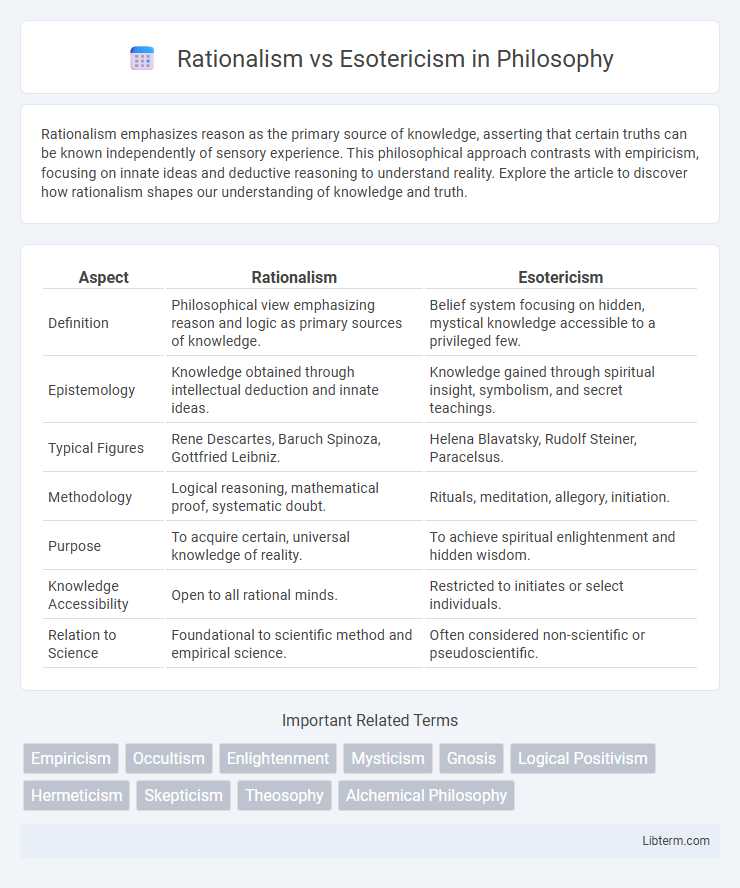Rationalism emphasizes reason as the primary source of knowledge, asserting that certain truths can be known independently of sensory experience. This philosophical approach contrasts with empiricism, focusing on innate ideas and deductive reasoning to understand reality. Explore the article to discover how rationalism shapes our understanding of knowledge and truth.
Table of Comparison
| Aspect | Rationalism | Esotericism |
|---|---|---|
| Definition | Philosophical view emphasizing reason and logic as primary sources of knowledge. | Belief system focusing on hidden, mystical knowledge accessible to a privileged few. |
| Epistemology | Knowledge obtained through intellectual deduction and innate ideas. | Knowledge gained through spiritual insight, symbolism, and secret teachings. |
| Typical Figures | Rene Descartes, Baruch Spinoza, Gottfried Leibniz. | Helena Blavatsky, Rudolf Steiner, Paracelsus. |
| Methodology | Logical reasoning, mathematical proof, systematic doubt. | Rituals, meditation, allegory, initiation. |
| Purpose | To acquire certain, universal knowledge of reality. | To achieve spiritual enlightenment and hidden wisdom. |
| Knowledge Accessibility | Open to all rational minds. | Restricted to initiates or select individuals. |
| Relation to Science | Foundational to scientific method and empirical science. | Often considered non-scientific or pseudoscientific. |
Introduction to Rationalism and Esotericism
Rationalism emphasizes reason and empirical evidence as the primary sources of knowledge, advocating logical analysis and skepticism toward unverifiable claims. Esotericism involves hidden or secret knowledge, often linked to mysticism, spirituality, and symbolic interpretations beyond conventional understanding. The contrast between rationalism's focus on objective truths and esotericism's pursuit of inner, subjective experiences highlights differing approaches to acquiring knowledge and meaning.
Historical Origins and Evolution
Rationalism, rooted in Enlightenment philosophy of the 17th century, emphasizes reason and empirical evidence as the foundation of knowledge, tracing back to thinkers like Descartes and Spinoza. Esotericism, with origins in ancient mystery traditions and Hermeticism, evolved through the Renaissance and into modern occult movements, prioritizing hidden knowledge and spiritual insight beyond mainstream scientific understanding. The historical evolution reveals a tension between rational empirical methods and symbolic, mystical interpretations of reality.
Core Philosophical Principles
Rationalism emphasizes reason as the primary source of knowledge, relying on logic, empirical evidence, and intellectual deduction to understand reality. Esotericism, by contrast, centers on hidden knowledge accessible through mystical insight, spiritual experience, and symbolic interpretation. The core philosophical principle of rationalism is objective truth grounded in rational processes, while esotericism values subjective, transcendent wisdom beyond conventional understanding.
Rationalism: Key Tenets and Thinkers
Rationalism emphasizes reason as the primary source of knowledge, asserting that reality can be understood through logical deduction and intellectual inquiry rather than sensory experience. Key tenets include the belief in innate ideas, the use of mathematics and logic as tools for discovery, and skepticism toward empirical evidence alone. Prominent rationalist thinkers such as Rene Descartes, Baruch Spinoza, and Gottfried Wilhelm Leibniz laid the foundation for modern philosophy by advocating that certain knowledge is achievable through reason independent of experience.
Esotericism: Beliefs and Influences
Esotericism encompasses a range of mystical and hidden knowledge systems emphasizing personal spiritual insight beyond empirical evidence. Its beliefs often include metaphysical concepts such as alchemy, astrology, and theosophy, deeply rooted in symbolic interpretation and secret traditions. Influences of esotericism permeate art, literature, and religious movements, shaping alternative worldviews that challenge rationalist paradigms.
Methods of Inquiry and Epistemology
Rationalism relies on logical reasoning and empirical evidence as primary methods of inquiry, emphasizing deduction and systematic analysis to acquire knowledge. Esotericism, in contrast, draws on intuition, symbolism, and mystical experiences as epistemological tools, often valuing hidden or transcendent truths accessible only through personal revelation. Rationalism prioritizes objective, verifiable knowledge, while esotericism embraces subjective insight and metaphysical interpretations beyond empirical verification.
Rationalism in Modern Science and Society
Rationalism in modern science emphasizes empirical evidence and logical reasoning as the foundation for knowledge, driving advancements in technology, medicine, and engineering. This approach promotes skepticism and critical thinking, fostering a systematic method of inquiry that challenges superstition and unverified beliefs. Rationalism's influence extends into contemporary society by shaping education, policy-making, and public discourse, ensuring decisions are grounded in objective analysis rather than mystical or esoteric claims.
Esotericism in Contemporary Thought
Esotericism in contemporary thought emphasizes hidden knowledge, symbolic systems, and spiritual experiences as sources of truth beyond empirical rationalism. It challenges the dominance of scientific materialism by integrating mysticism, ritual, and metaphysical insights into understanding reality. Modern esoteric practices often intersect with psychology, alternative medicine, and cultural studies, highlighting a resurgence of interest in inner transformation and transcendent wisdom.
Contrasts and Points of Convergence
Rationalism emphasizes logical reasoning, empirical evidence, and systematic doubt as the primary means to acquire knowledge, contrasting sharply with esotericism's reliance on mystical insights, symbolic interpretations, and secret wisdom often accessible only through initiatory experiences. Both approaches, however, seek deeper understanding beyond surface appearances, with rationalism pursuing objective truths through critical analysis and esotericism aiming for transcendent knowledge through spiritual practices. The convergence lies in their shared quest for knowledge as a transformative process, though their methodologies and epistemologies remain fundamentally distinct.
Impact on Culture and Worldview
Rationalism fosters a culture grounded in scientific inquiry, empirical evidence, and logical reasoning, shaping a worldview that values objectivity and skepticism towards metaphysical claims. Esotericism influences culture by embracing symbolic knowledge, spiritual experiences, and hidden meanings, promoting a worldview centered on mysticism and inner transformation. The clash between these perspectives affects societal attitudes toward knowledge, authority, and the interpretation of reality.
Rationalism Infographic

 libterm.com
libterm.com